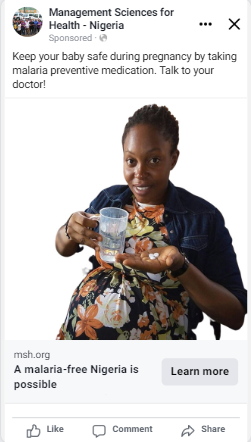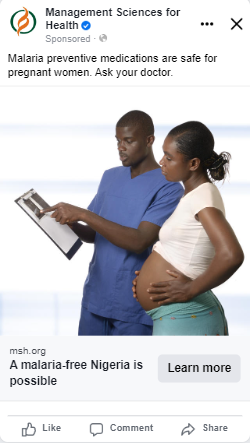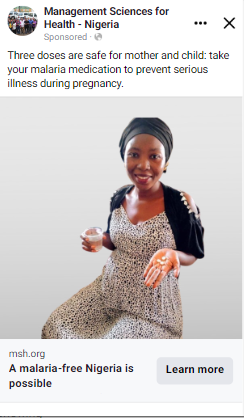Using Social Media to Encourage the Uptake of Malaria Preventive Treatment by Pregnant Women in Nigeria
Using Social Media to Encourage the Uptake of Malaria Preventive Treatment by Pregnant Women in Nigeria
Two years into our partnership with Meta, we used ad credits to run social behavior change campaigns on Facebook and Instagram, encouraging the uptake of malaria preventive treatment among pregnant women. This work builds on the lessons of a pilot campaign in 2021, which focused on encouraging the uptake of COVID-19 vaccine among men in Nigeria.
Executive summary

- In 2022, MSH continued its partnership with Meta to explore how online messaging may contribute to a positive change in knowledge and attitudes about certain health behaviors.
- In Nigeria, we ran an online campaign targeting locations where we have active programs, resulting in better overall improvements when compared to last year when we ran ads independently of our programming work on the ground.
- The current campaign saw more people expressing the likelihood of recalling the ads when compared to last year, an indication of the local impact of our brand and the effectiveness of our ads, which were developed using insights from our active programs.
Between March and November 2022, MSH partnered with Meta to develop and launch an ad campaign to boost ongoing efforts by our malaria program teams. We ran the online campaigns in Delta, Ogun, Oyo, Cross River, and Benue states because, in addition to having active programs in these states, they have large audiences of women on Facebook that could be targeted with ad campaigns.
To achieve the campaign’s objective of encouraging women to take all prescribed malaria preventive treatment during pregnancy, we developed messaging focused on addressing the key barriers to malaria treatment uptake: lack of awareness of the importance of taking the medication, concerns about the safety of the medication, and a lack of knowledge about where to access it. In consultation with our programs, we also identified one of the key drivers likely to encourage women to receive malaria preventive treatment as the desire to give birth to healthy babies free from malaria complications. In our consultations, health workers were identified as trusted sources of health information among the people we work with. Other pregnant women were identified as strong peer influencers.
These insights helped us develop our messaging, which highlighted the safety of the medications and called on women to take responsibility for protecting the health of their babies, giving them agency. We also used the images of health workers in our campaign creatives, complemented by images of women who have taken the medications. A common feature of the campaign creatives was a “Learn More” tab that served as a call to action for the audience to visit the MSH website to learn about how they can be protected from malaria.
Overall, comparing the period of August–November 2022 (when our online campaign was active) to the same period in 2021, MSH’s website saw users from Nigeria increase from 7,911 to 25,432, an increase of 221%. This demonstrated that approximately 16,000 Nigerians took an active step to learn more about preventing malaria because of the campaign. This group was 63% female, and the largest age demographic was 25-34, demonstrating that the campaign was effective in reaching the target group.

Results
The campaign ran in two phases, August 18-September 18 and October 24-November 24, targeting women aged 18-45. The first phase focused on messaging about the safety and importance of taking malaria preventive medications, and the second phase included an additional message about where women can go to access malaria preventive treatment. During this time, the campaigns reached 2.07 million people in Phase 1 and 2.45 million people in Phase 2, together reaching more than 4.5 million people between August and November. Using Meta’s brand lift study tool, we measured some encouraging results:
- The first phase of the campaign saw a lift of 5.0+ among women 18-24 when measured for safety. Based on the 2.07 million population reached by the campaign, this means it is likely that an additional 103,500 people expressed confidence that it is safe to take malaria preventive medication during pregnancy.
- The first phase of the campaign saw a lift of 4.0+ among women 25-34 when measured for importance. Based on the reach of the campaign, this means it is likely an additional 82,800 people within this demographic expressed the importance of taking malaria preventive medication during pregnancy.
- The second phase of the campaign measured for access to malaria preventive medication. Among women aged 35-44 the campaign saw a brand lift of 3.8. Based on the 2.45 million reached in this campaign, that means it is likely an additional 93,100 people expressed that they know where to access malaria preventive medication when they are pregnant. The brand lift among women 45-54 is 4.9+, meaning it is likely 120,050 people within this demographic expressed that they know where to get these medications when they are pregnant.
- There is also the likelihood that the first campaign increased brand awareness among 163,530 people. In the second campaign, it is statistically likely that an additional 335,650 people expressed being aware of the MSH brand.
Learnings

- Run online campaigns in locations where we have active programs. These will not only complement ongoing program work but will make ads more memorable and improve the recognition of your brand.
- Communications team members should work with technical team members to understand the barriers and drivers to behavioral change and use this insight in developing messaging and creatives.
- Develop messaging echoing similar messaging by your team on the ground and use creatives with images from locations where you work to create familiarity and consistency in messaging.
Next Steps
This campaign taught us that there is a lot of potential in using digital tools to complement the work in our existing health programs, especially in countries like Nigeria where there is a significant number of people on social media platforms like Facebook and Instagram. This provides a great opportunity for our communications team to work with technical teams across our programs in providing solutions that would lead to achieving program goals.